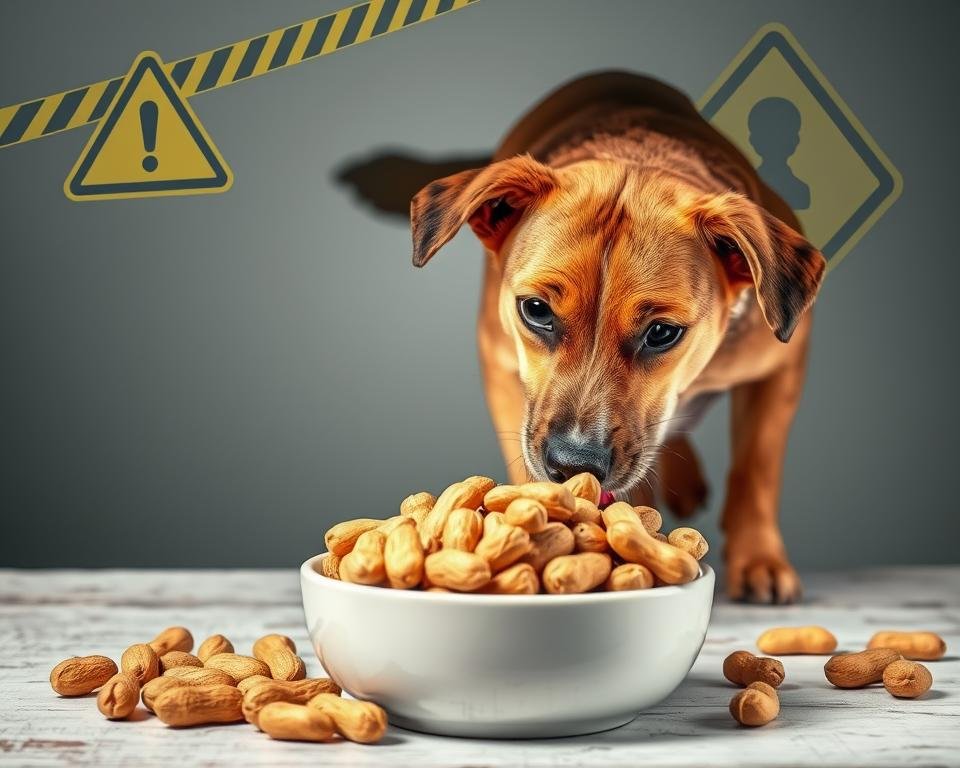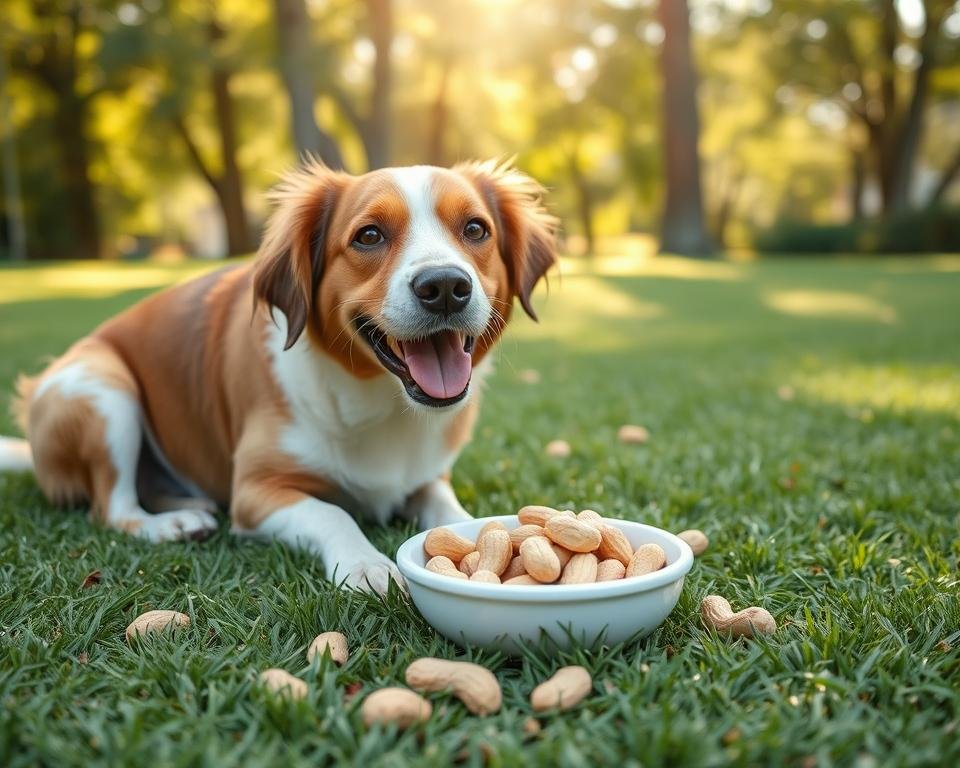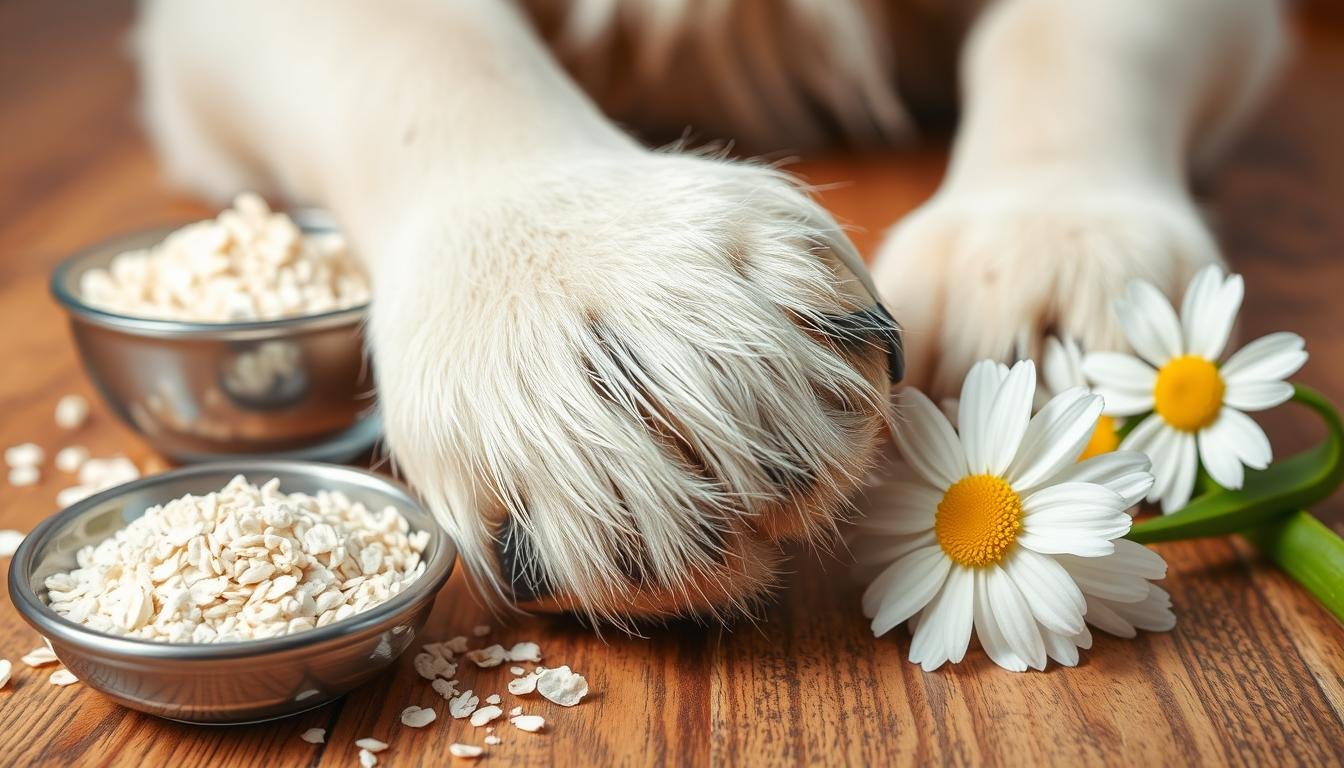Peanuts can be a tasty and nutritious treat for dogs. It’s important to know how to add them safely to a dog’s diet. Peanuts offer valuable proteins, vitamins, and healthy fats. But, it’s all about moderation and safety.
Dogs can usually eat peanuts without problems. But, some types and ways of preparing them are safer than others. Dry-roasted or raw, unsalted peanuts are best for dogs. Avoid salted, fried, or flavored peanuts because they can be too salty.
Peanut shells can also be dangerous, as they can cause choking, mainly in smaller dogs. Remember, peanuts should only make up 10% of a dog’s daily food to avoid weight gain or health issues.
Knowing how to safely give peanuts to dogs can make them a great snack. We’ll explore the benefits, safety tips, and how much to give. This way, your dog can enjoy peanuts without any worries.
Understanding the Nutritional Value of Peanuts for Dogs
Peanuts may not be the healthiest snack for dogs, but they have good stuff in them. They have niacin, vitamin B6, vitamin E, phosphorus, and potassium. These are all important for a dog’s health.
Essential Vitamins and Minerals in Peanuts
Peanuts are packed with vitamin B6. This vitamin is key for a dog’s metabolism, immune system, and blood cells. Vitamin E in peanuts helps the immune system and skin stay healthy. Phosphorus and potassium in peanuts are great for strong bones and muscles, and for nerve and muscle health.
Health Benefits for Your Canine Companion
Even though peanuts have a lot of fat, they also have good fats, proteins, and other nutrients. These can help a dog’s heart, skin, and energy levels. But, remember, peanuts are not a full meal for dogs.
They should only be given as an occasional treat. Eating too many peanuts can cause stomach problems, weight gain, and even pancreatitis.
When it comes to peanut butter, pick a dog-safe kind without xylitol. It’s okay to give a little bit, but it should not be a big part of their diet.
Can Dogs Eat Peanuts: Safety Guidelines and Precautions
Peanuts can be a tasty treat for dogs, but safety is key. Can dogs be allergic to peanut butter? While rare, peanut allergies in dogs are possible. Always introduce peanuts carefully and watch for any bad reactions.
Choose unsalted, dry-roasted, or raw peanuts without shells. Avoid flavored or seasoned peanuts. Is peanut butter bad for dogs? Make sure peanut butter doesn’t have xylitol, which is toxic to dogs.
- Peanuts are a good source of protein, healthy fats, and essential vitamins and minerals for dogs.
- Moderation is key – a few peanuts per day as a treat is generally safe, but excessive consumption can lead to digestive upset, diarrhea, and vomiting.
- Dogs with kidney problems or who are overweight should avoid peanuts due to their high fat and sodium content.
- Watch for signs of allergic reactions, such as itching, swelling, or difficulty breathing, and consult your veterinarian if you suspect an allergy.
Start with small amounts of peanuts or peanut butter and watch your dog’s reaction. Always check with your vet to make sure peanuts are safe for your dog.
| Peanut-Based Treats | Safety for Dogs |
|---|---|
| Unsalted, dry-roasted peanuts | Safe in moderation |
| Raw peanuts | Safe in moderation |
| Flavored or seasoned peanuts | Not recommended |
| Peanut butter containing xylitol | Toxic and should be avoided |
| Peanut butter-filled pretzels, sandwiches, and crackers | Not safe due to added ingredients |
By following these guidelines, you can safely give peanuts as an occasional treat to your dog.
Types of Peanuts Safe for Dogs
Not all peanuts are safe for dogs. The best ones are unsalted, dry-roasted, or raw peanuts without shells. Raw peanuts can have aflatoxin, a fungus that’s bad for dogs. So, it’s safer to choose human-grade peanuts.
Roasted peanuts are safer because roasting reduces aflatoxin risk. But, avoid peanuts with salt, flavor, or coatings. can dog eat peanut butter if it’s without xylitol or too much salt and sugar.
Boiled Peanuts and Other Preparations
Boiled peanuts are not good for dogs because of the salt and seasonings. These can upset a dog’s stomach. Stick to plain peanuts for your dog.
Homemade peanut butter is safer because you can control what’s in it. Just remember to give it in small amounts and as part of a balanced diet.
“Moderation is key when it comes to feeding peanuts to dogs. Peanuts should not make up more than 10% of a dog’s daily caloric intake.”
Potential Health Risks and Warning Signs
Peanuts can be safe for dogs if given in small amounts. But eating too many can upset their stomach. This might cause vomiting, diarrhea, or even pancreatitis.
Flavored peanuts have salt, which is bad for dogs with heart or kidney problems. It’s important to watch how much they eat.
Peanut butter can be dangerous because it might have xylitol. This is very bad for dogs. Symptoms include acting strange, seizures, and trouble breathing.
Choking on peanut shells is another risk, mainly for small dogs. It’s best to avoid giving them shells.
Eating too much peanut butter or peanuts can make dogs gain weight. This is bad for their health. It’s key to keep an eye on how much they eat.
| Dog Size | Suggested Peanut Portion |
|---|---|
| Small (1-10 kg) | 1-2 peanuts |
| Medium (11-26 kg) | 3-4 peanuts |
| Large (27+ kg) | 5-6 peanuts |
Always talk to a vet before giving dogs new foods like peanuts or peanut butter. This helps keep them safe and healthy.

“Feeding dogs small amounts of plain, unsalted peanuts as an occasional treat can be safe, but it’s important to monitor their intake and be aware of the possible risks.”
The Connection Between Peanuts and Peanut Butter
Peanut butter is a favorite treat for many dogs. But not all kinds are safe for them. It’s important to know the dangers and pick safe options.
Xylitol Warning: A Hidden Danger
One big worry with peanut butter is xylitol. This artificial sweetener is very bad for dogs. It can make their blood sugar drop too low and even harm their liver. Always check labels for xylitol, which might be called “natural sweetener” or “sugar alcohol.”
Choosing Dog-Safe Peanut Butter Options
To keep your dog safe, choose unsweetened, low-sodium peanut butter. Or make your own to control what’s in it. Some brands even make peanut butter just for dogs.
While can dogs eat peanut butter and is peanut butter bad for dogs are common questions, remember to limit how much you give. Peanut butter is high in fat, so too much is not good.
“Peanut butter can be a safe and enjoyable treat for dogs, but it’s important to choose the right variety and serve it in moderation.”
Proper Serving Sizes Based on Dog Size
Feeding can dogs have peanuts or can dog eat peanut butter to your dog needs careful thought. The right amount depends on your dog’s size. This is for their safety and health.
- Extra-small dogs (2-20 lbs): 1-2 peanuts or 1/4 tablespoon of peanut butter, twice daily
- Small dogs (21-30 lbs): 2-3 peanuts or 1/2 tablespoon of peanut butter, twice daily
- Medium dogs (31-50 lbs): 5-6 peanuts or 3/4 tablespoon of peanut butter, twice daily
- Large dogs (51-90 lbs): A handful of peanuts or 1 tablespoon of peanut butter, twice daily
- Extra-large dogs (91+ lbs): A large handful of peanuts or 1.5-2 tablespoons of peanut butter, twice daily
Remember, these are just guidelines. Your dog’s needs might be different. This could depend on their age, how active they are, and their health. Always talk to your vet to find out the best amount for your dog.
“Moderation is key when it comes to feeding can dogs have peanuts or can dog eat peanut butter to your dog. Excessive consumption can lead to weight gain and other health issues.”
By sticking to these serving sizes and keeping their diet balanced, you can give your dog the good stuff from peanuts and peanut butter. This way, they get the benefits without any health risks.
Signs of Peanut Allergies in Dogs
Peanut allergies in dogs are rare but can happen. If your dog eats peanuts or peanut butter, watch for signs of an allergic reaction.
Signs of a peanut allergy in dogs include trouble breathing, skin swelling, itching, hives, or stomach upset. If you see these signs after your dog eats peanuts, contact your vet right away. A severe allergic reaction can be deadly.
When introducing new foods, like peanuts or peanut butter, do it slowly. Watch for any bad reactions. If your dog has a peanut allergy, avoid these foods. Choose safe treats instead.
“Dogs can develop allergic reactions to peanuts, with symptoms such as itchiness, red or bald spots on the skin, and excessive paw chewing.”
Studies show food allergies in dogs are rare. But some breeds, like Cocker Spaniels, Labrador Retrievers, and German Shepherd Dogs, might be more likely to have them.
If you think your dog has a peanut allergy, talk to your vet. They can help figure out the cause and find a way to manage it. With the right care, your dog can stay safe and happy.
Special Considerations for Different Dog Health Conditions
Feeding peanuts and peanut butter to dogs needs careful thought. Some health conditions make these snacks risky. It’s important to know the risks before giving them to your dog.
Dogs with Heart Disease
Dogs with heart disease should not have salted peanuts or peanut butter. These foods have too much salt. This can hurt their heart even more. Choose unsalted, plain options if you must give them peanuts.
Overweight Dogs and Fat Content
Peanuts and peanut butter are full of calories and fat. This is bad for overweight or obese dogs. It can make them gain more weight and cause health problems like joint pain. Give these snacks in small amounts or not at all to overweight dogs.
Always talk to your vet before giving peanuts or peanut butter to your dog. This is even more important if they have health issues. Your vet can tell you how much is safe and what else to avoid.
“Moderation is key when it comes to feeding peanuts and peanut butter to dogs with health conditions. Always prioritize your pup’s specific needs and veterinary recommendations.”
Conclusion
In conclusion, can dogs eat peanuts and can dogs have peanuts in moderation. It’s important to consider a few things. Unsalted, dry-roasted, or raw peanuts without shells are safest for dogs.
When it comes to peanut butter, make sure it’s xylitol-free. It should also be low in salt and sugar. Always introduce new foods slowly and watch for any bad reactions. Remember, your dog’s size, health, and diet matter when giving them peanuts as treats.
While peanuts can be good for dogs, they shouldn’t be their main food. If you’re unsure, talk to a vet about adding peanuts to your dog’s diet. By following these tips, you can give your dog peanuts safely and enjoy it together.
With the right care and portion sizes, can dogs eat peanuts and can dogs have peanuts can be a fun and safe treat for both you and your dog.
FAQ
Q: Can dogs have peanuts?
A: Yes, dogs can have peanuts in small amounts. Unsalted, dry-roasted, or raw peanuts without shells are safe for them.
Q: Is peanut butter bad for dogs?
A: Peanut butter is okay for dogs in small amounts. Just make sure it doesn’t have xylitol, which is harmful
Q: Are peanuts bad for dogs?
A: Peanuts are usually safe for dogs, but in small amounts. They have a lot of fat, which can be hard for dogs to digest.
Q: Can dogs be allergic to peanut butter?
A: Peanut allergies in dogs are rare. But, they can happen. Signs include trouble breathing, swelling, itching, or upset stomach.
Q: Can dogs eat peanut butter?
A: Yes, dogs can eat peanut butter, but only in small amounts. Make sure it doesn’t have xylitol, which is toxic.



